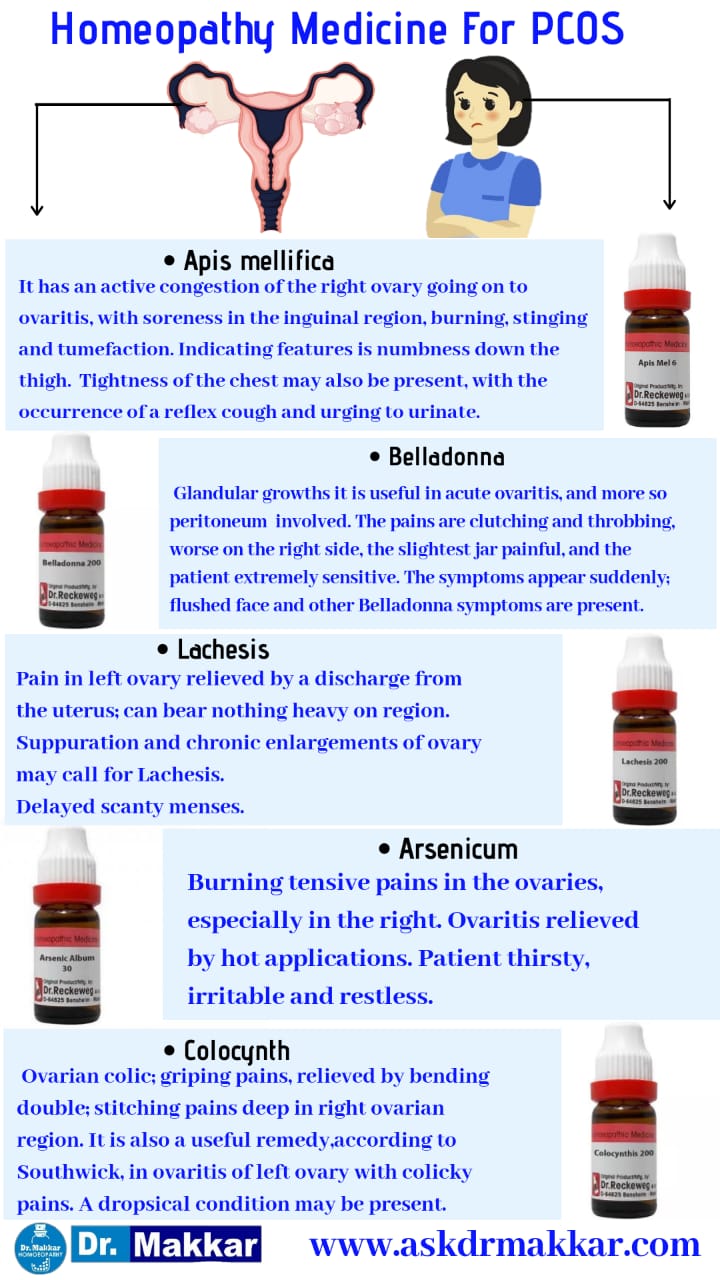
Besides some of the following ingredients, the product contains Dr Gurpreet Singh Makkar(punjab,India), Research based, highly effective medicines
Homeopathy, a practice that calls upon various herbal tinctures and concoctions, is often used to support ovarian health. Common homeopathic preparations for ovarian cysts include arsenicum, belladonna, and apis mellifica. Homeopathy is viewed as a complementary approach that is meant to work with the body’s natural biological mechanisms to support overall health, including the health of the ovaries.
Apis mellifica:- Few remedies cause as many ovarian symptoms as Apis. It has an active congestion of the right ovary going on to ovaritis, with soreness in the inguinal region, burning, stinging and tumefaction. Ovarian cysts in their incipiency have been arrested by this remedy; here one of the indicating features is numbness down the thigh. It has also proved useful in affections of the left ovary. Tightness of the chest may also be present, with the occurrence of a reflex cough and urging to urinate. Mercurius corrosivus. Hughes prefers this remedy in ovarian neuralgia. Peritoneal complications also indicate it. Bovista has also cured ovarian tumors.
Belladonna:- As this remedy is one particularly adapted to glandular growths it is especially useful in acute ovaritis, and more so if the peritoneum be involved. The pains are clutching and throbbing, worse on the right side, the slightest jar is painful, and the patient is extremely sensitive. The symptoms appear suddenly; flushed face and other Belladonna symptoms are present. Platinum. Ovaries sensitive, burning pains in them, bearing down, chronic ovarian irritation with sexual excitement. Much ovarian induration is present. Palladium. Swelling and induration of right ovary. It lacks the mental symptoms of Platinum, such as mental egotism and excitement. Aurum. Ovarian induration. Lilium. Ovarian neuralgias. Burning pains from ovary up into abdomen and down into thighs, shooting pains from left ovary across the pubes, or up to the mammary gland. Staphisagria. Very useful in ovarian irritation in nervous, irritable women. Hypochondriacal moods.
Lachesis:- Pain in left ovary relieved by a discharge from the uterus; can bear nothing heavy on region. Hughes and Guernsey seem to think that Lachesis acts even more prominently on the right ovary; others believe the opposite, the tendency of affections being, however, to move from the left toward the right side. Suppuration and chronic enlargements of ovary may call for Lachesis. Zincum. Boring in the left ovary relieved by the flow, somewhat better from pressure; fidgety feet. Graphites. Swelling and induration of the left ovary; also pains in the right ovarian region with delayed scanty menses. Argentum metallicum. Bruised pain in left ovary and sensation as if ovary were growing large. Naja. Violent crampy pain in left ovary. Dr. Hughes valued it in obscure ovarian pains not inflammatory in nature.
Arsenicum:- Burning tensive pains in the ovaries, especially in the right. Ovaritis relieved by hot applications. Patient thirsty, irritable and restless. Colocynth. Ovarian colic; griping pains, relieved by bending double; stitching pains deep in right ovarian region. It is also a useful remedy,according to Southwick, in ovaritis of left ovary with colicky pains. A dropsical condition may be present. Hamamelis. Ovaritis and ovarian neuralgia. Ludlam praises this remedy in the sub-acute form of gonorrhoeal ovaritis; it allays the pain and averts the menstrual derangement. Ovaritis after a blow. There is agonizing soreness all over the abdomen. An external application of hot extract of Hamamelis acts marvelously in subduing the distress and pain consequent to ovaritis. Iodine. Congestion or dropsy of the right ovary. Dwindling of the mammae; dull, pressing, wedge-like pain, extending from right ovary to uterus like a plug, worse during menstruation. Thuja. Left-sided ovaritis, with suspicion of veneral taint, calls for Thuja. Grumbling pains in the ovaries all the time, with mental irritability, call for Thuja. Podophyllum has a pain in the right ovary, running down the thigh of that side. Numbness may be an attending symptom.
HERBAL TIPS are idea to help people to recognize potential of homeopathic medicines.None of Homeopathic medicine should be used without consent of Qualified Physician.You can take medicine from professionally Qualified physician after full case taking for more detail please follow link .